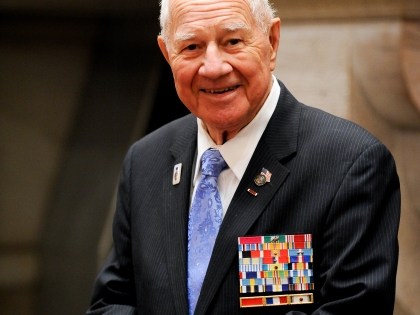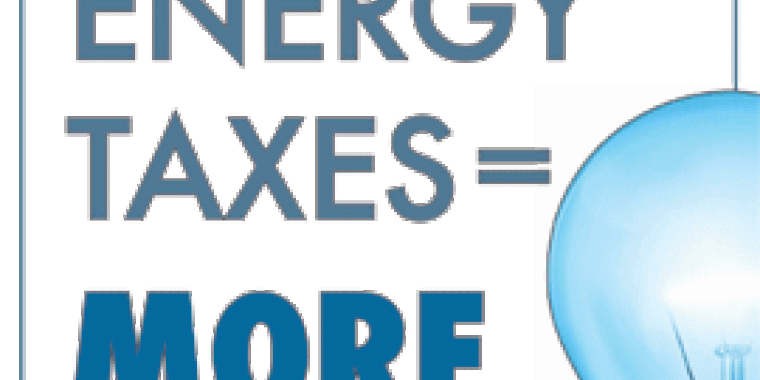
Senate Republicans Call on Governor To Remove Utility Tax Surcharge Extension From Executive Budget
William J. Larkin Jr.
February 5, 2013
-
ISSUE:
- Economic Development
- Energy
- Taxes
- Budget

Senate Republican Leader Dean Skelos and members of the Senate Republican Conference were joined today by leaders of statewide business organizations to urge Governor Cuomo to remove the proposed extension of the utility tax surcharge from his Executive Budget. The 18-a surcharge, which has increased utility bills for every ratepayer in the state, is scheduled to expire on March 31, 2014. The Governor’s proposed five-year extension would cost businesses and consumers a total of almost $3 billion.
Senate Republicans were joined at a Capitol news conference by representatives of the Business Council of New York State, the National Federation of Independent Businesses, the Manufacturers Association of Central New York, the New York Farm Bureau and AARP. Other businesses groups, including Unshackle Upstate and the Long Island Association, also support the Senate’s call to end the utility tax surcharge as scheduled.
"I oppose the extension of this utility surcharge and urge the Governor to remove it from future budget negotiations," said Senator Bill Larkin (R-C-I, Cornwall-on-Hudson). "This surcharge is an impediment to the growth and expansion of both large and small businesses throughout the Hudson Valley and allowing it to expire will send a strong message that we are serious about making New York a business friendly state."
The proposed extension would cost energy ratepayers $509 million for this year and the following four years, as well as $255 million in state fiscal year (SFY) 2018-19. The total impact of the extension would be $2.8 billion, with most of the burden falling on small and large businesses, particularly manufacturers that use large amounts of energy. Senate Republicans said the Governor should use the 21-day amendment process to remove the proposed extension from his budget plan. The actual impact on the SFY 2013-14 budget of ending the surcharge would be $236 million, a small amount in the context of a $136.5 billion budget.
According to figures from National Grid, the impact of the energy tax extension on a typical large business is estimated at $30,000 per year. The added cost on a typical small business would be about $540 per year and average household utility bills would increase by $55 per year.
The energy tax surcharge was imposed in 2009 by Senate Democrats and Governor Paterson on electric, gas, steam and non-municipal water services. Every Senate Republican voted against it. The surcharge was intended to be a temporary measure that would expire on March 31, 2014. However, the 2013-14 Executive Budget proposes to extend the tax surcharge for another five years.
Heather Briccetti, president and CEO of The Business Council of New York State, Inc. said: “New York's electric rates are heavily burdened by hidden taxes. A report by Public Policy Institute finds more than one-quarter of electric bills in New York are from state and local taxes. Extending the so-called ‘Section 18-a’ fee will cost all energy consumers in the state at total of $2.8 billion. We urge the governor to reconsider and use the 21-day amendments process to amend or remove Part N. In 2009, when this temporary fee was imposed, there was an explicit promise to the people of the state that this tax would not be permanent.”
Mike Durant, NFIB/NY State Director said: “Energy costs consistently rank as a top concern for small business, and assessments such as 18-a have been a significant cost driver in energy. Repealing this onerous tax has been a priority for NFIB and we are pleased to join with the Senate Republican Conference in calling for this tax extension to be removed from the Executive Budget proposal."
Julie Suarez, New York Farm Bureau Public Policy Director, said: “At a time when the prices of feed and fuel are sky high for our members, it is imperative for the state to allow the Article 18-a assessment step down to go forward to help contain rising production costs. Profit margins are thin at best for many of New York’s family farms, and keeping the 2% “tax” in place is not the business friendly approach that will help New York’s farms be more competitive. We appreciate the efforts of Senator Skelos and his conference to push for the rollback to continue as scheduled.”
Beth Finkel, State Director for AARP New York, said: “AARP commends the Senate for their leadership in working to make utility bills more affordable for all New Yorkers. This is a crucial kitchen table issue, as state residents pay some of the highest utility costs in the nation, a status that takes an unduly harsh toll on the elderly and those on fixed incomes. This move, coupled with AARP's push to help consumers have a stronger voice during rate hikes, is surely needed to help New Yorkers better afford the basic necessity of their utilities."
Section 18-a of the Public Service Law authorizes an assessment on utility bills to fund the operations of energy-related agencies and authorities such as the Department of Public Service and the New York State Energy Research and Development Authority. In 2009, Governor Paterson and Senate Democrats permanently increased the assessment from one-third of a percent to one percent, and added an additional one-percent surcharge, making for a total five-fold increase on all ratepayers. The additional revenue raised from the increase is deposited in the state’s general fund. Under the 2009 law, the increase is scheduled to be reduced to one percent in SFY 2014-15.
Share this Article or Press Release
Newsroom
Go to NewsroomSenator Larkin Announces Correction Officer Exam
December 8, 2016
THANKSGIVING ESSAYS AND CONTRIBUTIONS SD 39
November 22, 2016

Larkin and Skoufis Announce Renaming of Road for Community Leader
October 26, 2016